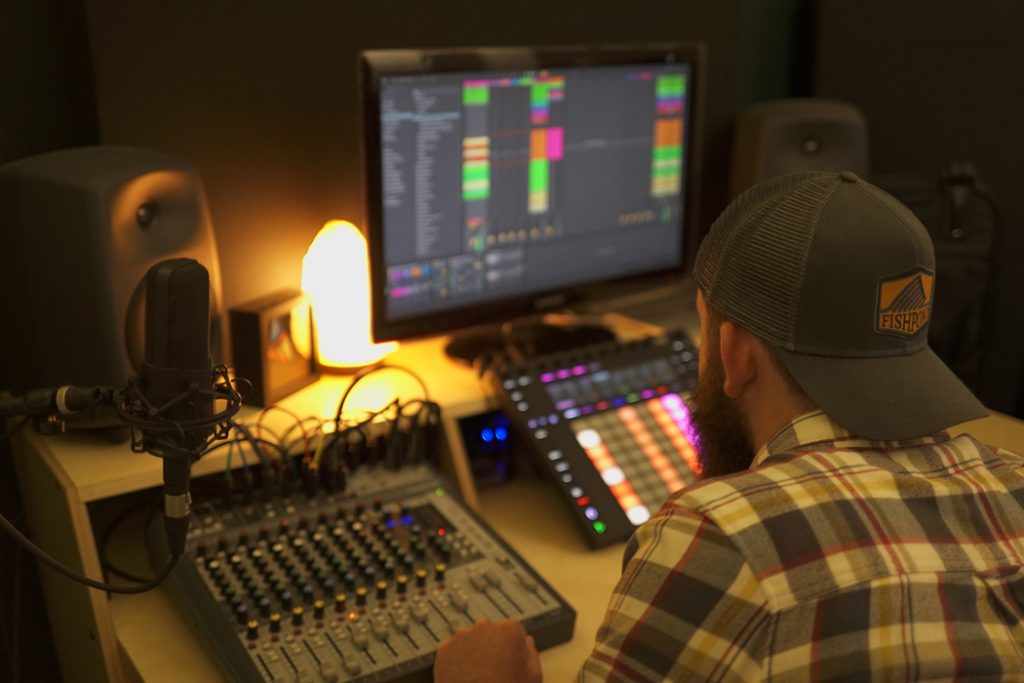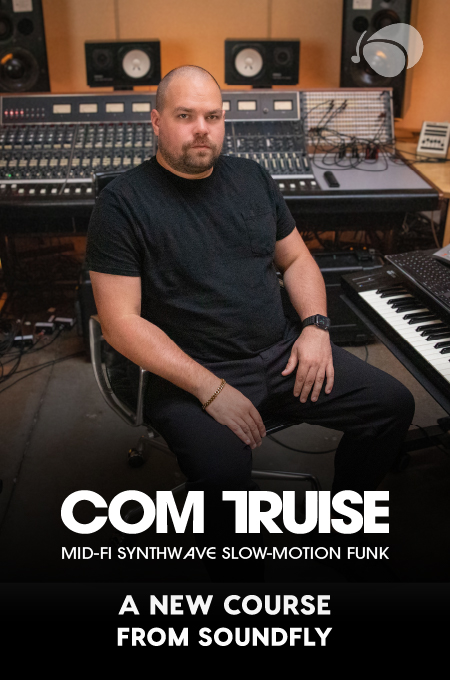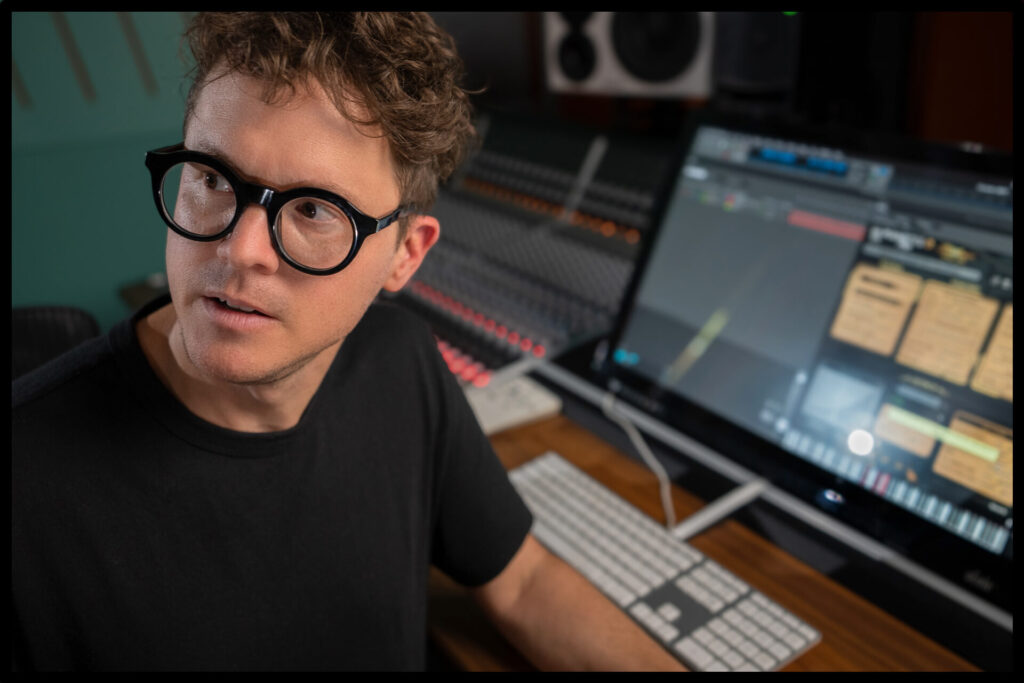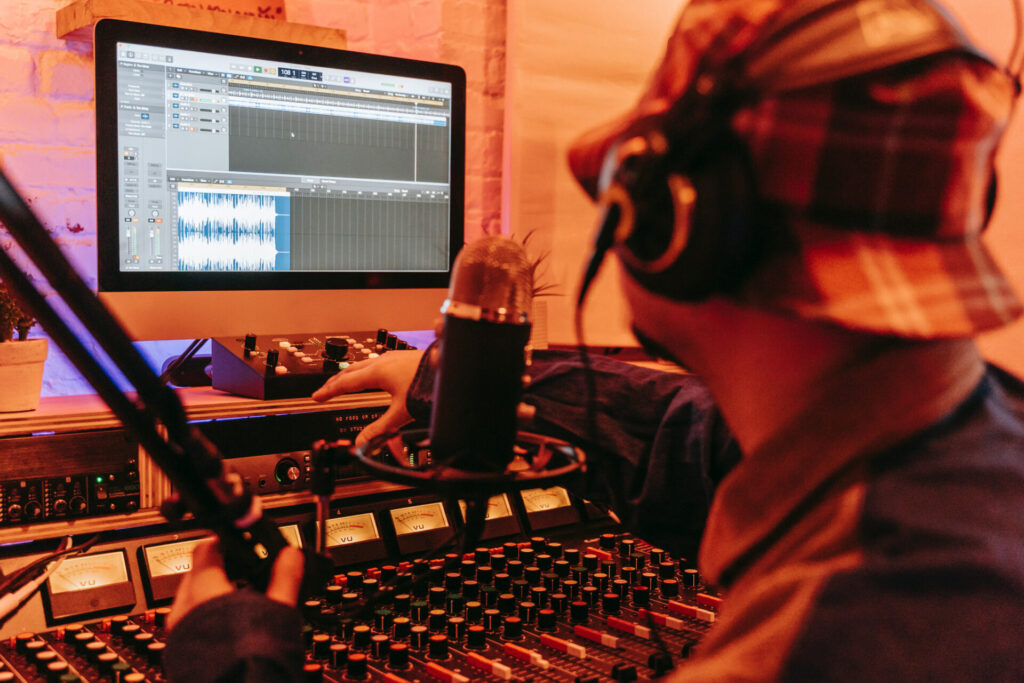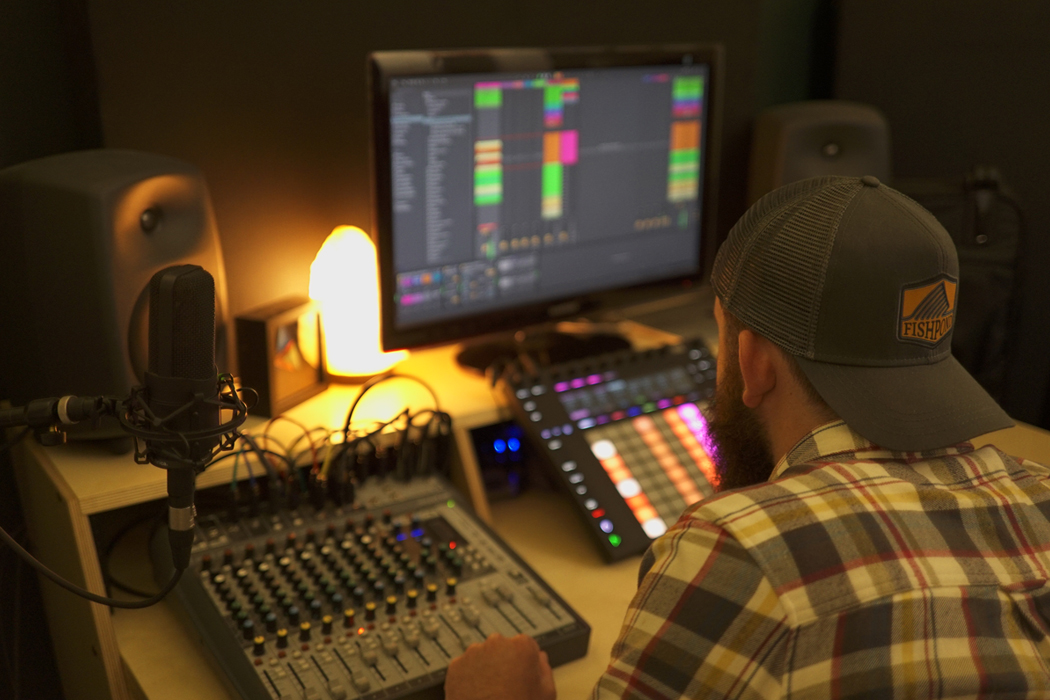
It’s still Home Recording Week here on Soundfly and beyond, so for those of you who have made a commitment to yourselves to produce better music in the comfort of your own home, we’ve got a ton of helpful resources to help you improve your knowledge, skills, and strategies.
So whether you’re a musician eager to get some demos recorded at home, a producer looking to make better use of your personal space, or a fully committed DIY home recordist, we definitely have an online course for you. But which one is the right one? Let’s explore the options!
Free Courses on Soundfly
Our free courses in the realm of home recording include: Demo Recording 101, Any Sound Will Do, and Live Clicks and Backing Tracks. They make great supplemental materials to help you improve specific useful skills and expand your knowhow for free.
These short courses are meant to be taken in about a week and usually alongside a personal project of the same nature, so you can put your learning into action immediately. Here’s a bit more about these free online courses:
Demo Recording 101
Veteran sound engineer Vishal Nayak of Black Lodge Recording will take you through the process of recording a professional-grade demo in a day using only two microphones. The course covers the “basics” — how to record all of your instruments and sort out your arrangement so you have a track you can be proud of at home. Don’t think of it as recording a “demo” — you’ll be learning how to do a lot with very little. Throughout the course, you’ll follow along as singer-songwriter Arthur Lewis records his original track “We Ride.”
Any Sound Will Do
This is a two-part course series dedicated to sampling found sounds at home and turning them into all kinds of beats and tracks in Ableton Live. The first part is taught by Ableton Certified Trainer Brian Jackson, and concerns how to capture sounds using a simple microphone setup at home, and warp them into useable raw materials in Ableton. The second part follows famed YouTuber, beat maker, and educator Andrew Huang as he makes an incredibly compelling song out of nothing but sounds from a kitchen pot — and explains his process step by step on camera.
Live Clicks and Backing Tracks
Taught by Alex Wilson of the Australian band Sleepmakeswaves, this course is less about recording at home and more about how to take in-the-box material and make it come to life while you’re performing onstage. We take you through the best gear to use, how to organize your tracks in Ableton Live, how to setup your laptop rig, and much more!
Intro to Making Music in Logic Pro X
What is this course all about?
Instructed by composer and producer Martin D. Fowler (This American Life, Limetown, etc.), this course is an all-encompassing boot camp in one of the most widely used and most multi-functional DAWs out there: Logic Pro X. It’s used by pro-level producers, songwriters, engineers, and composers of all types to achieve the sound they’re searching for. Logic is also extremely affordable as far as DAWs go, making it perfect for the home-recording musician.
This course will get you composing, recording, and editing both audio and MIDI, as well as manipulating effects in Logic Pro X fluidly. You’ll get comfortable navigating around the environment and using Logic’s many features to express yourself creatively, while creating a consistent body of new work.
Who should take this course?
Any home-recording musicians, producers, or instrumentalists who are new to working in DAWs, and want to get up and running making music in Logic Pro X, regardless of style or genre. This course will also briefly touch on mixing as part of a more holistic music-making process. You’ll need a copy of Logic Pro X to get the most out of the course.
What will I be able to do by the end?
It’s right there in the title — you’ll be able to make music in Logic Pro X! By the end of this course, you’ll be comfortable writing and editing complete tracks in Logic, and starting to get your mixes sounding awesome in a rough state.
Preview Intro to Making Music in Logic Pro X for free here.
Songwriting for Producers
What is this course all about?
Whether you consider yourself an electronic producer, songwriter, amateur musician, or synthesist, if you plan to be creating musical work on your own, it’s vital to understand how to turn raw ideas into songs, organize and construct various song sections and integrate them together fluidly, and make your track listenable to a wide audience range.
Instructed by multi-instrumentalist, engineer, and educator Will Marshall, this premium online course will also help you develop workflow strategies and time (and space) management skills so you’re not wasting valuable time and resources working in your home studio.
Who should take this course?
This course is for producers and DAW users who have no trouble generating ideas, but tend to veer off track and spend all their creative energy on the production, leaving the actual song behind too early in the process. It’s also for any non-professional songwriters (musicians, composers, synthesists) who produce music at home, but lack structure in their process. The course is genre-agnostic, but is best suited for those who lean heavily on their computer to make music.
What will I be able to do by the end?
By the end of this experience, you’ll learn how to take raw ideas and turn them into the best possible sounding song. Some specific stops along the way include utilizing advanced harmony, rhythm, and bass; the difference between songs and productions; how successful songs are structured; creative strategies that you can apply to your own music; and how to revamp your workflow to emphasize the song’s emotive power and listenability.
Preview Songwriting for Producers for free here.
The Art of Hip-Hop Production
What is this course all about?
This premium online course is the brainchild of composer, educator, and cultural diplomat Charles Burchell, and provides a deep, well-rounded understanding of the subtleties of hip-hop beat production. We cover areas of producing hip-hop such as: writing beats and bass lines from scratch, creative sampling techniques, arranging and songwriting, mixing, and more, with a specific eye to hip-hop’s many subgenres.
You’ll learn how to dissect the specific elements that make hip-hop unique as a genre, and master them in your own music. Another of the many great perks of joining this course is that we’ve partnered with our friends at Splice to give all students two months of free access to their library of samples, so you can get started sampling and making hip-hop beats immediately!
Who should take this course?
This course is for producers, rappers, musicians, songwriters, and even people with no prior knowledge of hip-hop whatsoever who want to learn their way around the genre and culture of hip-hop and get their feet wet immediately. You might be a seasoned producer looking to add this genre to your toolbox, a musician looking to collaborate with artists in the hip-hop sphere, or an up-and-coming artist trying to open up some new opportunities and make it big. No matter what your intentions, we’ll help you make some great music at home.
What will I be able to do by the end?
By the end of this course, you’ll have the essential skills of sampling, producing, and arranging hip-hop beats and full tracks down pat. You’ll be starting to look inward at your own voice as a producer, and be equipped with the tools needed to succeed in this new (or perhaps very familiar) space. Specifically, you’ll learn about drums, bass, loops, structures, and sampling techniques, and how to utilize arrangement, harmony, and melody to express your ideas with the production methods to bring them to life.
Preview The Art of Hip-Hop Production for free here.
Faders Up I: Modern Mix Techniques
What is this course all about?
The first in our two-course series exclusively focused on mixing, Faders Up I: Modern Mix Techniques takes a macro-lens approach to the mix process, so you’ll get a well-rounded knowledge of every basic parameter used to create professional-sounding audio tracks, including referencing, panning, routing, signal flow, EQ, compression, reverb, and much more. You’ll also learn ear-training exercises to make sure you’re hearing your mix correctly and responsibly.
This course is instructed by nine top sound engineers who have worked with artists such as Beyoncé, D’Angelo, Solange, Sia, Mark Ronson, the New York Philharmonic, the Dirty Projectors, and many more, and it’s navigated by our in-house hip-hop producer, Nyle Emerson.
Who should take this course?
Anyone who’s ready to take a deep dive into the world of mixing. You should be aware of mixing’s role in the music production process, but you don’t need to know anything about how to mix to take this course. You should be able to record audio at home and/or be comfortable creating audio in your DAW of choice. Once again, you can be a practitioner of any style of music, and you should get super excited when someone gives you a new song to listen to.
How much do I need to know about mixing?
For this course, you really just need to know enough about mixing that you know you need to learn more. If you’ve ever struggled to communicate with a mix engineer in order to get the sound you’re looking for, or listened to your own tracks and been unable to pinpoint exactly what you need to do to improve your sound, this is the course for you.
What will I be able to do by the end?
You’ll be able to create working mixes and communicate confidently with professional mix engineers about how to get the best sound out of your music.
Preview Faders Up I: Modern Mix Techniques for free here.
Faders Up II: Advanced Mix Techniques
What is this course all about?
The second course in the Faders Up series, Advanced Mix Techniques is structured quite differently from the first. Here, you’ll gain insights from renowned sound engineers, but it’ll be much more tightly focused, both on their personal sound-crafting techniques and the tried-and-true techniques that pertain to specific genres (hip-hop, rock, metal, pop, and cinematic orchestral). We even threw in an entire section on the basics of mastering as an added bonus.
The highly influential course instructors are: Kenta Yonesaka (Unlocking the Truth, Kendrick Lamar, Chance the Rapper), Tim Leitner (Carly Simon, Adam Ezra, Billy Joel), Brian Losch (Maria Schnieder, Yo-Yo Ma, Chris Thile), and Leon Kelly (Run the Jewels, Kaytranada, Action Bronson).
Who should take this course?
Anyone who wants to create professional-quality mixes of their own music, or who aspires to be a professional mixing engineer and is looking for a way in. In this course, you’ll actively work on mixes in different genres, getting you ready to mix any style of music you’re likely to encounter.
How much do I need to know about mixing?
Faders Up II is designed for producers with some hands-on mixing experience who are looking to expand their arsenal of skills and approaches, especially when it comes to working with a larger variety of artists and clients. You should be ready and excited to get your feet wet working on a set of audio tracks provided by the course (and that you bring in yourself).
What will I be able to do by the end?
You’ll come out with a small portfolio of finished mixes and feel confident taking on mixing projects, regardless of genre.
Preview Faders Up II: Advanced Mix Techniques for free here.
Headliners Club: Custom Mentorship Sessions
What is this “course” all about?
The Headliners Club is kind of like a “build your own customized course.” If you need help on a specific project that doesn’t quite fit within one of our courses, you’ll be able to work with a Soundfly Mentor one-on-one to create a customized one-month learning program specifically tailored to your needs and goals.
Some examples of past sessions include adding production magic to your tracks, arranging and finishing musical ideas, producing an EP, or getting help building an audience for your music. We’ll find you a Soundfly Mentor specifically suited to your project who will work with you to figure out what it takes to get it done. Just tell us a little bit about yourself to be matched with a mentor right away.
Who should take this course?
Is it a total cop-out if we just said “everyone”? Anyone on any musical level can benefit from having a trained eye and ear standing by to help you make the most out of the goals you set out to accomplish. This custom mentorship program works best for motivated people with a specific musical project or goal in mind. It’s like having a personal trainer at the gym, but for your music.
What will I be able to do by the end?
At the beginning of your four-week session, you and your mentor will lay out your goals and aspirations, what you’d like to accomplish, and/or what you’d like to improve upon. It’s our job to get you to that place, and give you the tools you need to move even further than that.
Learn more about the Headliners Club program here or tell us about your musical goals so we can pair you with a Soundfly Mentor and get you started right away!
Good luck on your home recording journey! If you have any questions, or just want to make sure you’re enrolling in the right online course, feel free to get in touch with us at [email protected].
